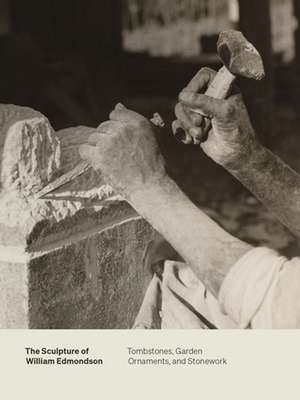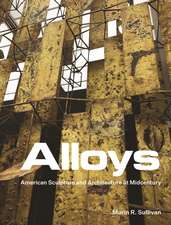The Sculpture of William Edmondson
Editat de Marin R Sullivanen Limba Engleză Paperback – 15 sep 2021
Preț: 183.31 lei
Nou
Puncte Express: 275
Preț estimativ în valută:
35.08€ • 36.49$ • 28.96£
35.08€ • 36.49$ • 28.96£
Carte disponibilă
Livrare economică 22 martie-05 aprilie
Preluare comenzi: 021 569.72.76
Specificații
ISBN-13: 9780826502360
ISBN-10: 0826502369
Pagini: 168
Dimensiuni: 226 x 302 x 13 mm
Greutate: 0.91 kg
Editura: Vanderbilt University Press
ISBN-10: 0826502369
Pagini: 168
Dimensiuni: 226 x 302 x 13 mm
Greutate: 0.91 kg
Editura: Vanderbilt University Press
Notă biografică
Renée Ater holds a B.A. from Oberlin College, and a M.A. and Ph.D. in Art History from the University of Maryland. A public scholar who works at the intersection of art and history, Dr. Ater's research focuses on monuments, race, national identity, and public space. She is the author of Keith Morrison, volume 5 of The David C. Driskell Series of African American Art (Pomegranate Books, 2005) and Remaking Race and History: The Sculpture of Meta Warrick Fuller (University of California Press, 2011). She has written on a wide range of public monuments including the Unsung Founders Memorial at the University of North Carolina; the African American Civil War Memorial in Washington, DC; the Martin Luther King Jr. Memorial in Rocky Mount, North Carolina; the Tuskegee Airmen National Historic Site in Alabama; and the Crispus Attucks Memorial in Boston. Currently, Dr. Ater is engaged in an open-source digital project entitled Contemporary Monuments to the Slave Past: Race, Memorialization, Public Space, and Civic Engagement, which has been funded through the National Endowment for the Humanities-Mellon Foundation, The Getty Research Institute, and the Smithsonian Office of Fellowships. Kéla B. Jackson is a Ph.D. student in the department of History of Art and Architecture at Harvard University. Her research and writing interests include modern and contemporary art of the African Diaspora, spatial and aesthetic articulations of selfhood and citizenship, as well as notions of memory and archives among Black women and queer artists. Jackson has held various positions at the Samuel P. Harn Museum of Art at the University of Florida, High Museum of Art, Spelman College Museum of Fine Art, and the Radcliffe Institute for Advanced Study at Harvard University. She received her B.A. in Art with a concentration in Art History and a minor in African Diaspora Studies from Spelman College. Ellen Macfarlane is a Lecturer in the Art History Department at the University of Southern California. Her research focuses on the history of photography, American art, and vernacular visual culture in the 20th century. She received her PhD in Art & Archaeology from Princeton University in 2018. Her current book project examines the early 1930s California art photography collective, Group f.64, and analyzes the group's engagement with Depression-era debates regarding the relationship of aesthetics and politics in light of its strong stance against photographic manipulation. Macfarlane's writing has appeared in American Art, Southern California Quarterly, and caa.reviews. She has held fellowships from the Smithsonian American Art Museum, the ACLS/Luce Foundation, the Center for Creative Photography, and the Huntington Library. Anne Monahan is an art historian based in New York and focused on modern and contemporary art. She is the author of Horace Pippin, American Modern (2020); Faith Ringgold: Die (2018); articles in Art Journal, The Metropolitan Museum Journal, and Nka: The Journal of Contemporary African Art, among others; and contributions to various museum catalogues. Betsy Phillips is the Marketing Manager at Vanderbilt University Press. Her writing has appeared in The Nashville Scene and The Washington Post. She is the author of Dynamite Nashville: Unmasking the KKK, the FBI, and the Bombers Beyond Their Control (2021), and contributed an essay "Perverse Incentives," to Greetings from New Nashville: How a Sleepy Southern Town Became "It" City (2020). Marin R. Sullivan (PhD, University of Michigan) is a Chicago-based art historian, consultant, and curator. She is Curator-at-Large at Cheekwood Estate & Gardens in Nashville, where she focuses on postwar and contemporary sculpture initiatives. Sullivan also serves as the Director of the Harry Bertoia Catalogue Raisonné and is a member of the Board of Trustees for the International Sculpture Center. She specializes in the histories of modern and contemporary sculpture, especially its interdisciplinary, intermedial dialogues with design and the built environment. Sullivan is the author of Sculptural Materiality in the Age of Conceptualism (2017) and Alloys: American Sculpture and Architecture at Midcentury (2022) as well as numerous essays and articles in publications including American Art, Art History, History of Photography, and Sculpture Journal. Her research has been supported by fellowships from the Smithsonian American Art Museum and the Crystal Bridges Museum of American Art. Learotha Williams, Jr., PhD is an Associate Professor of African American and Public History and coordinator of the North Nashville Heritage Project at Tennessee State University. Dr. Williams teaches courses that explore enslavement and emancipation in Tennessee, African American history, and Public Memory. He is also a member of Tennessee's Review Board for the National Register of Historic Places, serves on the Board of the Metro Historical Zoning Commission, Historic Nashville, Inc., Promise Land Heritage Association, and is a member of the Board of the friends of Fort Negley. Since his arrival at Tennessee State University, he and his students have worked closely with African American Heritage societies and organizations throughout Middle Tennessee where they have focused on African American history in rural spaces. He has completed an edited work with Amie Thurber PhD "I'll Take You There: Nashville's Social Justice Sites (Vanderbilt University Press, 2021) and he is currently writing "A Song in a Strange Land: Black Nashville in History and Public Memory." This work will explore the role African Americans have played in Nashville's history and how we study and celebrate it in public spaces. Dr. Williams is a native of Tallahassee, Florida where earned his PhD from Florida State University in 2003.


















